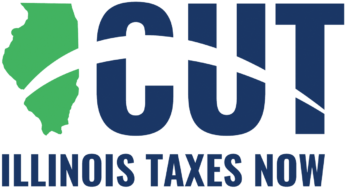
What Illinoisans Need to Know about the Progressive Income Tax
By Orphe Divounguy
In November 2020, Illinoisans will get an extremely rare opportunity to have their voices heard on a statewide policy question.
Specifically, they will face a ballot question about adopting a progressive state income tax, where tax rates rise with income.
Should voters approve the referendum, Gov. J.B. Pritzker has already signed into law the new rate structure that would take effect. It is a $3.4 billion tax hike on individual taxpayers and businesses in Illinois.
But during debates about the amendment, several lawmakers suggested the progressive income tax proposal didn’t go far enough in raising rates. One suggested tax rates in excess of 10%. And Pritzker has made more than $10 billion in spending promises from the tax, even though he only projects $3.4 billion in revenue from it.
These calls for even higher rates – and state politicians’ habit of breaking tax promises – have fueled fears that the “fair tax” amendment is simply a blank check for Springfield, courtesy of middle-class taxpayers.
Here’s what Illinoisans need to know about the progressive income tax proposal.
How does the progressive tax vote work?
A question asking whether voters approve of the progressive income tax measure will appear on November 2020 ballots. The exact wording of the question has yet to be determined. The requirements for passage are that the amendment will need either the approval of 60% of voters voting on the question, or greater than 50% approval from all voters who cast ballots in the election.
Here’s a hypothetical example to illustrate how the thresholds work:
- 5 million Illinoisans cast a vote in the November 2020 election
- 4 million Illinoisans cast a vote on the progressive income tax ballot amendment
- 2.3 million Illinoisans vote “yes” on the question (57.5%)
- 1.7 million vote “no” on the question (42.5%)
- Result: The amendment fails. 2.3 million “yes” votes is less than 50% approval from the 5 million Illinoisans who cast a vote in the election, and less than 60% approval of the 4 million voters who cast a vote on the ballot amendment.
- 4 million Illinoisans cast a vote on the progressive income tax ballot amendment
If voters approve, how will my taxes change?
If voters approve the constitutional amendment on the 2020 ballot, and new income tax rates aren’t passed by the Illinois General Assembly before then, Illinoisans will face income tax rates ranging from 4.75% to 7.99% starting Jan. 1, 2021.
Under Pritzker’s proposed progressive tax system, a married couple in Illinois with two kids earning the $79,168 median annual income and paying the average property tax bill of $4,157 would see $195 in total tax relief, according to the Pritzker administration’s online “fair tax calculator.”
But if that same family uses two cars on a regular basis, they will see a $300 tax hike under Pritzker’s capital plan, which doubled the state’s gas tax on July 1, and will hike annual vehicle registration fees starting in January 2020. Taken together, Pritzker’s plan would charge the typical family $105 more in taxes than they currently pay. And that’s before considering any increases in Illinois’ second-highest in the nation property taxes.
Illinois businesses will also see tax hikes under the progressive income tax plan, regardless of income. In fact, Illinois’ total corporate income tax would rise to the second-highest in the nation should voters approve Pritzker’s constitutional amendment.
Illinois businesses currently pay a total income tax rate of 9.5% – this includes a 7% corporate income tax plus a 2.5% Personal Property Replacement Tax, or PPRT. Under Pritzker’s plan, the total corporate income tax rate would increase to 10.49% (7.99% corporate income tax plus 2.5% PPRT).
That would be the second-highest rate in the nation, behind only Iowa at 12%. And notably, Iowa’s rate is scheduled to drop to 9.8% by 2021.
What about property taxes?
Property taxes are the largest state or local tax Illinoisans pay, and currently they pay the second-highest rates in the nation. Despite rhetoric from the governor that a progressive income tax will provide property tax relief, Pritzker has signed no legislation to make this a reality.
Instead, a Property Tax Relief Task Force has been commissioned to identify potential paths toward property tax relief. The task force’s findings are due by the end of 2019, and barring any recommendation for pension reform, will likely recommend increased state funding for local governments, potentially leading to higher state income taxes. And, again, Pritzker has promised more than $10 billion in new spending from a tax he projects will yield $3.4 billion more.
Will the progressive income tax fix state finances?
A progressive income tax will not solve Illinois’ fiscal issues. Despite several massive income tax hikes in recent years, Illinois has failed to pass a balanced budget since 2001, and the new budget is out of balance by up to $1.3 billion. At the same time, pension costs are projected to consume more than 27% of the state’s expected general revenues despite deteriorating fiscal conditions, significantly handcuffing spending on services.
Since 2000, state spending on pensions has grown by almost 680% while spending on employee health insurance has grown more than 240%. Without reforms to these massively rising cost drivers, growth in spending will far outpace growth in revenue.
What have other states done?
In the past two decades, no other state has switched from a flat income tax structure to a progressive income tax structure. In fact, three states have gone in the opposite direction, scrapping progressive income taxes in favor of a flat tax system. Utah in 2008, North Carolina in 2013 and Kentucky in 2018 all made the switch to a flat income tax structure and cut taxpayers’ rates. Additionally, Colorado voters in 2018 rejected a statewide ballot amendment that would have swapped the state’s flat income tax for progressive rates.
Most states that established progressive income tax structures did so in the early 20th century. The last state to switch from a flat income tax to a progressive income tax was Connecticut in 1996. The small tax cut quickly turned into a 13% tax hike on the middle class, did nothing to solve the state’s finances or balance their budgets, was unable to stymie growth in property taxes and contributed to a 47% increase in the state’s poverty rate.
Will Illinoisans get a voice on other constitutional amendments?
As things stand right now, Illinoisans will not be permitted to vote on other constitutional amendments such as fair maps or term limits, both of which are more popular than the progressive income tax. Despite the widespread popularity of these initiatives, no measures to place these issues on ballots in 2020 were passed this year.
Pritzker supported fair maps during his campaign but has largely gone silent on the issue during his first year in office. Meanwhile, the governor publicly opposed term limits on lawmakers.
